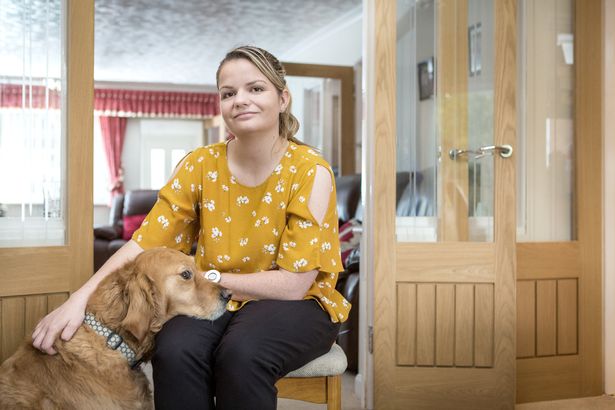 Lauren Pitt has been losing her sight since the age of 13 (Image: Virgin Media / Scope / Michael Leckie)
Lauren Pitt has been losing her sight since the age of 13 (Image: Virgin Media / Scope / Michael Leckie)Lauren Pitt has an impressive CV, she graduated with a 2:1 degree in Theology and has built up an extensive list of volunteering experience, so she didn’t imagine she would have too many problems finding work.
But as each application led to nothing she kept getting turned down.
However, after applying for over 250 jobs, Lauren found in the rare instances she did secure an interview, she found that the majority of the time was taken up explaining that she could do the job just as well as anyone else as she is registered blind.
She started losing her sight from the age of 13 due to a genetic condition and now has a Guide dog to help her.
Speaking to The Mirror she said, “When I graduated with a 2.1 degree in theology, I was under the illusion that with a good degree, a strong CV due to all of the volunteering I’d done, and a lot of determination, I would find a job with minimal difficulties,”
“This couldn’t have been further from the truth. I applied for over 250 jobs in a variety of roles but I had no response from about half of them.
“I think a lot of recruiters underestimated what I could do because of my impairment. In interviews, I spent most of my time explaining that I could do the job just as well as anyone else.
“Eventually I received an extremely positive email from an employer, inviting me for an interview and asking how they could make it best for me and if my guide dog would need any water.
“After the interview I was offered the job as an administrator for a social enterprise. It just shows how employers’ misguided attitudes can be a real barrier preventing disabled people finding work.”
Sadly, Lauren’s experience is not unique for a disabled person. At present, there are 1 million people in the UK who are disabled but have found themselves unable to find employment.
A recent study for Scope revealed that disabled people are being “shut out of the jobs market” due to the attitudes and discrimination they can face throughout the recruitment process. The results showed that disabled people typically only hear from less than half of the employers they apply for jobs with – compared to 69 per cent of those who do not have a registered disability.
Lauren’s sight started to deteriorate at the age of 13 due to a genetic condition called Leber Hereditary Optic Neuropathy which begins to show its effects in early life. In most cases it begins with the loss of sight in one eye, followed shortly by vision problems in the other. The condition affects around one in 50,000 people.
Lauren added: “When I did telephone interviews people were initially interested until I mentioned that I was visually impaired and lost my sight at the age of 13.
“I didn’t want to stop saying that I’d lost my sight, because I wanted people to accept me for who I was, I didn’t want people to want me because I didn’t have my disability my disability is a part of me, but I come before that.”
“When I was applying for jobs, they didn’t ask the questions I expected. They were more bothered about my disability than my qualifications and what I could bring. They wanted to know how being blind could stop me doing my job or what they’d need to put in place
“It took me nine months to find a job, and I applied for over 250. Initially I thought ok I’ll apply for more and get interviews. I became disheartened. It got to the point where I was applying even though I thought I wouldn’t get an interview.”
Lauren now has an administrative role at the Department for Work and Pensions.
Chief Executive at Scope, Mark Atkinson, said: “We have a huge amount of work to do to tackle the disability employment gap. At the current pace of change, the Government is set to fail on its pledge to get a million more-disabled people into work.
“Disabled people with all the skills to do the job are being repeatedly passed over for roles, while others are being forced to apply for jobs which they know they are overqualified for.
“Employers are missing out on the talent they badly need because they don’t have the right support in place or because of outdated attitudes towards disability.
“At Scope we want disabled people, colleagues, line managers, employers and others to get behind the Work With Me campaign and work with us to ensure disabled people have an equal opportunity to work.”
‘Work With Me’ is a three-year initiative by Scope and Virgin Media to recognise and tackle the challenges disabled people face getting into and staying in work.
Recruiters love this COMPLETE set of Accredited Recruitment & HR Training – View Training Brochure








